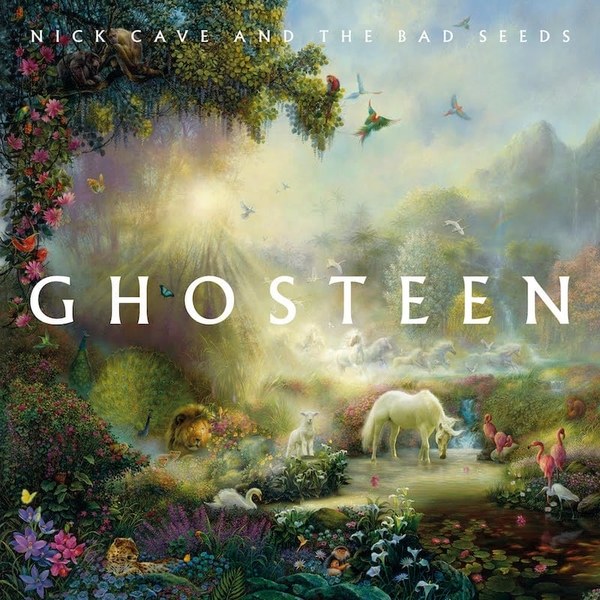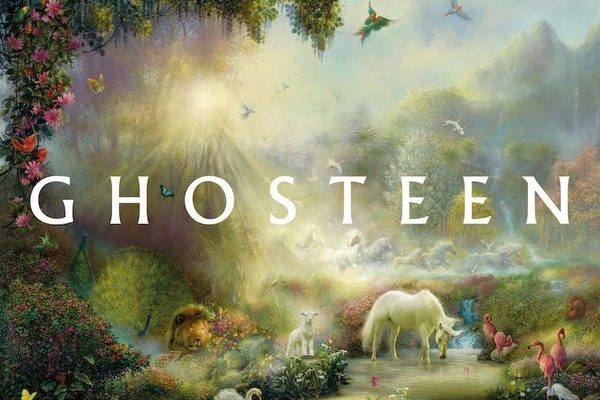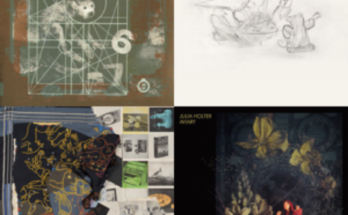
It’s commonly said that no parent should have to bury their child. But in Ghosteen, Nick Cave learns to cope with this reality.
In a follow-up to 2016’s Skeleton Tree, Nick Cave and the Bad Seeds presents Ghosteen, an album where Cave learns to cope and make peace with the darkest chapter of his life: the death of his son. In his seminal previous album, Skeleton Tree, Cave laid down some bleak, mournful songs, and while those didn’t specifically pertain to the death of his son, Ghosteen most definitely does. The title of the album alludes to this fact: the suffix “-een” meaning “little or small,” and paired with the word ghost, one can deduce that it means roughly “little ghost.”
First and foremost, this is a double album and is split up into two parts: the first representing “the children” and the second representing “the parents.”
The album opens with one of the better tracks: “Spinning Song.” You hear a synth radiating in suspended space, conjuring images of a floating, brightly burning soul. When the bells and chimes kick in, a rush of wonder and mystery hits you. Cave’s grim voice enters shortly after, with lyrics alluding to Elvis. My favorite part is when the melody takes a climatic rise when Cave starts singing the lines, “I love you / And peace will come.” This track truly sets the atmosphere for the rest of the album.
Next is the track “Bright Horses,” which opens with a somber piano and some high-flying vocals. Like most of his songs, Cave’s lyrics are vague, poetic, and laced with a deeper meaning. I’m no scholar, but the lyrics seem to talk about how his son will always be by his side, and he’ll be seeing him soon again. My favorite part is towards the end, where the background vocals aid the melody of the piano. My favorite lines are: “And everyone is hidden, and everyone is cruel / And there’s no shortage of tyrants and no shortage of fools.” True to its title, this song is a bright horse – delicate, enchanting, and majestic.
Fast forward a little bit, and you’re listening to “Sun Forest,” an ethereal journey that’s a little different than the rest of the other tracks. Like most of these songs, the synth is there to set the mood and the piano/vocals follow right after. When the background vocals kick in though, there is a moment where you should stop what you’re doing and appreciate the rush of euphoria and serenity that is hitting your ears. It’s a choir of angels that would make even the purest of nuns orgasm in holy delight. (God, did I really just write that?) Anyway, this track in particular really hits the right beats for me. The lyrics seem to be about the beauty of children, including Cave’s son, ascending into heaven, and not having any hesitation about letting them go off into the great beyond.
The album closes on “Hollywood,” which has Cave ruminate on an existential acceptance of death How romantic! Firstly, this track is 14 minutes long. At first glance, I thought the record took a turn into the prog-rock direction. It doesn’t, but similar to many prog-rock epics by Rush and King Crimson, the focus here is not on musicality, but the mood and general atmosphere. The mood begins as a meditation, but 5 minutes in, crescendos to a galloping drumbeat. This whole time, Cave is singing about how his “time will come” a reference to how death spares no one. At 9 minutes in, the album takes an odd turn – a bass note drags the album down to its darkest point. Fittingly, Cave references an ancient Buddhist story about a woman losing her baby, and how she has to come to terms with the inevitable death of all humans; it’s obvious that Cave sees himself in this story. The album then ends the same way it started: “And I’m just waiting now, for my time to come / And I’m just waiting now for peace to come/ For peace to come…”
Overall, the album is good. I’d say it’s at least above average. The lyrics are something worth analyzing and Cave’s vocals remain raw and bare. The main tone and theme of this album can be likened to the unicorns on the front cover: sounding divine and magical. That being said, I have some problems with it.
My main gripe with it is that it lacks the “musical variety” that Cave’s previous album, Skeleton Tree had. Maybe it’s just my bias towards sadder songs, but musically, every song on this album sounds very similar to one another. Cave stands boldly atop a wall of bright synths and bright strings, for which he copes with the loss of his son and hopes for peace. On Skeleton Tree, the mood was dark, reflective, intimate and involved – on Ghosteen, the mood is still reflective and intimate, but trades darkness for composure and majesty. I guess that says more about my tastes than it does about the album.
I also dislike the lack of musical timbre on this album. It’s all synths, strings, pianos, and vocals. Don’t get me wrong, I love all of those, but the heavy exclusion of drums on this album is a musical crime! How does one of alternative rock’s most famous artists just kill the drums?
If you were to remove Cave’s vocals from each song on this album and show it to any passerby on the street, the first assumption would be that this is a movie soundtrack to the latest sci-fi film. The heavy use of synths makes me want to categorize it as an electronic or ambient album, but it sounds so orchestral and cinematic as well. This album reminds me of a brighter, more hopeful version of the keyboard sections of Pink Floyd’s Wish You Were Here, and if I’m really reaching, Vangelis’ Blade Runner soundtrack.
In spite of all that I’ve said, I still think this album deserves your ears.




